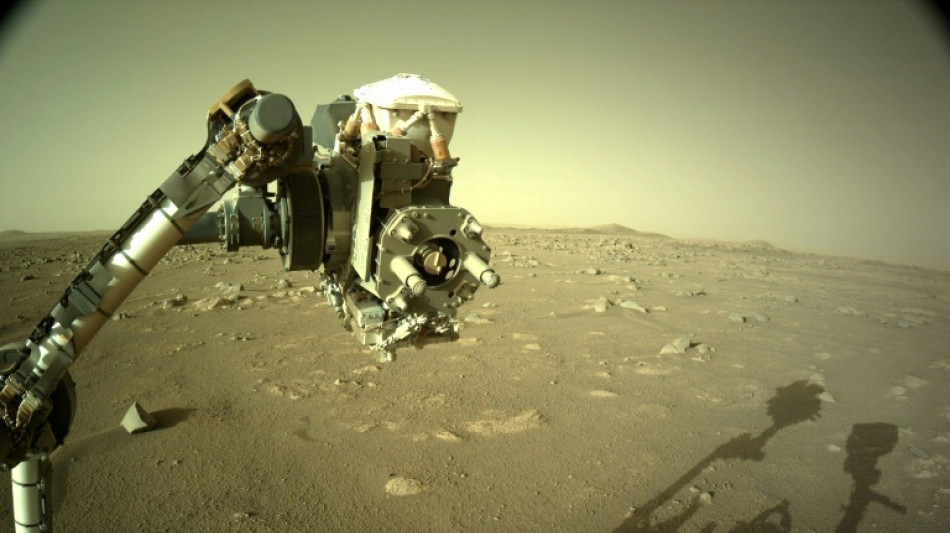
-
 French court jails one in Brigitte Macron cyber-bullying trial
French court jails one in Brigitte Macron cyber-bullying trial
-
Oil prices ease as investors track Venezuela fallout

-
 Patient killed in Russian strike on Kyiv clinic
Patient killed in Russian strike on Kyiv clinic
-
Myanmar pro-military party wins first phase of junta-run election: official results

-
 Double Olympic champion Chebet takes maternity break in 2026
Double Olympic champion Chebet takes maternity break in 2026
-
Amorim sacked by Man Utd after 14-month reign

-
 Maduro due for first US court hearing after capture
Maduro due for first US court hearing after capture
-
Manchester United sack manager Ruben Amorim

-
 Bangladesh says at least 287 killed during Hasina-era abductions
Bangladesh says at least 287 killed during Hasina-era abductions
-
South Korea's Lee meets Xi with trade, Pyongyang on the agenda

-
 Gauff shocked in United Cup, comeback kid Hurkacz stuns Zverev
Gauff shocked in United Cup, comeback kid Hurkacz stuns Zverev
-
Tech firms lead markets higher, oil swings after Maduro ouster

-
 Defending Brisbane champion Lehecka wins tough opener
Defending Brisbane champion Lehecka wins tough opener
-
Maduro's fall tests Venezuela's ruling 'club'

-
 'I can't walk anymore': Afghans freeze to death on route to Iran
'I can't walk anymore': Afghans freeze to death on route to Iran
-
UK starts ban on junk food ads on daytime TV and online

-
 Trump declares US 'in charge' of Venezuela and Maduro goes to court
Trump declares US 'in charge' of Venezuela and Maduro goes to court
-
Two killed in series of Russian attacks on Ukraine

-
 Kasatkina feels pressure to 'repay Australia' after Russia switch
Kasatkina feels pressure to 'repay Australia' after Russia switch
-
Suns stun NBA-best Thunder as East-leading Pistons top Cavs

-
 China's birth-rate push sputters as couples stay child-free
China's birth-rate push sputters as couples stay child-free
-
'Not about condoms': Chinese shrug off contraceptive tax

-
 Root's majestic 160 powers England to 384 in final Ashes Test
Root's majestic 160 powers England to 384 in final Ashes Test
-
Chalamet boosts Oscar bid with Critics Choice Awards win

-
 'Tuna King' pays record $3.2 mn for bluefin at Tokyo auction
'Tuna King' pays record $3.2 mn for bluefin at Tokyo auction
-
Tech firms lead Asian markets higher, oil swings after Maduro ouster

-
 Cricket Australia boss hits out at 'archaic' bad light rules
Cricket Australia boss hits out at 'archaic' bad light rules
-
Trump insists 'we need Greenland'

-
 Century-maker Root steers England to 336-6 in final Ashes Test
Century-maker Root steers England to 336-6 in final Ashes Test
-
'Free our president', Maduro supporters demand at rally

-
 Danish PM calls on US to stop 'threatening' Greenland
Danish PM calls on US to stop 'threatening' Greenland
-
North Korea tests hypersonic missiles, says nuclear forces ready for war

-
 Root in Ponting territory with 41st Test century at 5th Ashes Test
Root in Ponting territory with 41st Test century at 5th Ashes Test
-
Liposuction in Bellevue

-
 Who Is the Best FTM Top Surgeon in the U.S.?
Who Is the Best FTM Top Surgeon in the U.S.?
-
Alset AI Announces Shares for Debt Transaction

-
 Best Tummy Tuck in Las Vegas
Best Tummy Tuck in Las Vegas
-
Guan Huat Seng Holdings Berhad Launches IPO Prospectus To Drive Next Phase Of Growth

-
 Apex Receives Exploration Permit for Rift REE Project, Nebraska; Drill Program Preparation Underway
Apex Receives Exploration Permit for Rift REE Project, Nebraska; Drill Program Preparation Underway
-
South Korea's Lee to meet Xi with trade, Pyongyang on the agenda

-
 Messi's Miami sign Canada goalkeeper St. Clair
Messi's Miami sign Canada goalkeeper St. Clair
-
Pistons top Cavs as Pacers' NBA misery continues

-
 Gonzalo treble helps Real Madrid thrash Betis, Atletico hopes dented
Gonzalo treble helps Real Madrid thrash Betis, Atletico hopes dented
-
Djokovic quits players' union he co-founded

-
 Anne Frank's step-sister, Holocaust survivor Eva Schloss dies
Anne Frank's step-sister, Holocaust survivor Eva Schloss dies
-
France's Le Garrec inspires La Rochelle to Toulon rout

-
 Hosts Morocco reach AFCON quarter-finals as Cameroon knock out South Africa
Hosts Morocco reach AFCON quarter-finals as Cameroon knock out South Africa
-
Inter Milan reclaim Serie A summit

-
 Atletico title hopes dented in Real Sociedad draw
Atletico title hopes dented in Real Sociedad draw
-
Doue, Dembele light up first Paris derby in over 35 years


First audio recorded on Mars reveals two speeds of sound
The first audio recordings on Mars reveal a quiet planet with occasional gusts of wind where two different speeds of sound would have a strange delayed effect on hearing, scientists said Friday.
After NASA's Perseverance rover landed on Mars in February last year, its two microphones started recording, allowing scientists to hear what it is like on the Red Planet for the first time.
In a study published in the Nature journal on Friday, the scientists gave their first analysis of the five hours of sound picked up by Perseverance's microphones.
The audio revealed previously unknown turbulence on Mars, said Sylvestre Maurice, the study's main author and scientific co-director of the shoebox-sized SuperCam mounted on the rover's mast which has the main microphone.
The international team listened to flights by the tiny Ingenuity helicopter, a sister craft to Perseverance, and heard the rover's laser zap rocks to study their chemical composition -- which made a "clack clack" sound, Maurice told AFP.
"We had a very localised sound source, between two and five metres (six to 16 metres) from its target, and we knew exactly when it was going to fire," he said.
The study confirmed for the first time that the speed of sound is slower on Mars, travelling at 240 metres per second, compared to Earth's 340 metres per second.
This had been expected because Mars' atmosphere is 95 percent carbon dioxide -- compared to Earth's 0.04 percent -- and is about 100 times thinner, making sound 20 decibels weaker, the study said.
- 'I panicked' -
But the scientists were surprised when the sound made by the laser took 250 metres a second -- 10 metres faster than expected.
"I panicked a little," Maurice said. "I told myself that one of the two measurements was wrong because on Earth you only have one speed of sound."
They had discovered there are two speeds of sound on the surface of Mars -- one for high-pitched sounds like the zap of the laser, and another for lower frequencies like the whir of the helicopter rotor.
This means that human ears would hear high-pitched sounds slightly earlier.
"On Earth, the sounds from an orchestra reach you at the same speed, whether they are low or high. But imagine on Mars, if you are a little far from the stage, there will be a big delay," Maurice said.
"All of these factors would make it difficult for two people to have a conversation only five metres (16 feet) apart", the French CNRS research institute said in a statement.
- 'Scientific gamble' pays off -
It was otherwise so quiet on Mars that the scientists repeatedly feared something was wrong, the CNRS said, possibly provoking memories of two failed previous attempts in 1999 and 2008 to record sound there.
"There are few natural sound sources with the exception of the wind," the scientists said in a statement linked to the study.
The microphones did pick up numerous "screech" and "clank" sounds as the rover's metal wheels interacted with rocks, the study said.
The recording could also warn about problems with the rover -- like how drivers sense something's wrong when their car starts making strange noises.
Maurice said he felt the "scientific gamble" of taking microphones to Mars was a success.
Thierry Fouchet of the Paris Observatory, who was also involved in the research, said that listening to turbulence, such as vertical winds known as convection plumes, will "allow us to refine our numerical models for predicting climate and weather".
Future missions to Venus or Saturn's moon Titan could also now come equipped with microphones.
And Perseverance is far from done eavesdropping. While its core mission lasts just over two years, it could remain operational well beyond that -- the Curiosity rover is still kicking nine years into a planned two-year stint.
M.Thompson--AMWN



